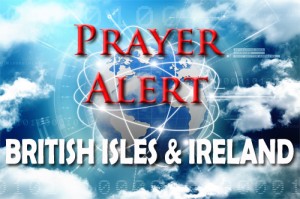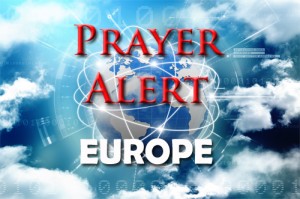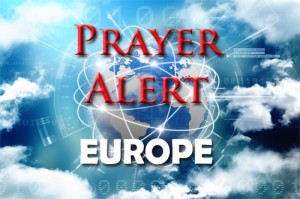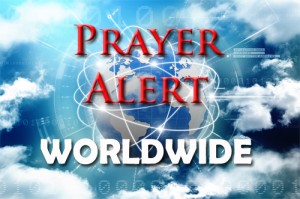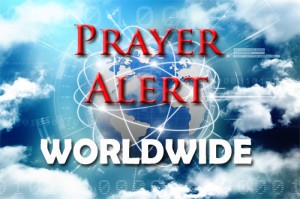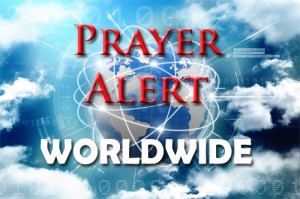
David Fletcher
David Fletcher is Prayer Alert’s Editor.
He is part of a voluntary team who research, proof-read and publish Prayer Alert each week.
If you would like to make a donation towards our running costs, please click here.
A church in Bristol, closed after it suffered bomb damage during the Second World War, will be reopened with a vision of making Jesus known to the city's young adults and vulnerable people. Rev Toby Flint, formerly a lead pastor at Holy Trinity Brompton in London, is going to lead St Nicholas on Baldwin Street. He said, ‘We're really excited to have been invited to reopen and restore the church to its original purpose, demonstrating the love of God. We want to build on the deep foundations of faith in the city, to reimagine church for a new generation, and play our part in meeting the needs of the most disadvantaged in Bristol.’ The setting for two major universities, Bristol has experienced an influx of students and young professionals in recent years. It is estimated that 60% of people living in the city centre are aged between 15 and 29.
Theresa May has replied to the Archbishop of Canterbury after he criticised the Government’s record in tackling poverty. She said that working hard was ‘the best route out of poverty’, rather than state interventions. Jeremy Corbyn used his speech to the party conference to praise the Archbishop and his recent report, in which, he said, ‘economic justice needs to be hard-wired into the way the economy works’. Justin Welby has adopted an increasingly strident tone in recent weeks, most notably with an outspoken attack on zero-hours contracts and the lack of opportunity for young people at the TUC’s annual conference. He said the wealthy should pay more tax, adding, ‘We cannot continue with an economy that works so badly for so many’. Theresa May’s reply to the archbishop was made on her trip to the USA, where she addressed 200 business leaders about the advantages of investing in the UK after Britain leaves the EU.
A poet and songwriter has complained to the Welsh Language Commissioner after HSBC told him it could not respond to his letter because it was written in Welsh. The bank asked Mr Lovgreen to resend his message informing them of his change of address because it was in a foreign language. HSBC has since apologised, and said it will offer better training to staff. Earlier this year MPs were able to speak Welsh during parliamentary debates for the first time at Westminster, after translation facilities were made available. See also the Europe article on Greater Europe Mission (GEM UK).
A leaked document has revealed that EU officials are making no-deal Brexit preparations due to ‘uncertainty’ over a deal passing through the House of Commons. EU ambassadors held a rare ‘closed session’ on 26 September, to discuss the prospect of Parliament rejecting the final divorce settlement. Officials will discuss mini-deals to keep aircraft flying, medicine supplies and ports moving in the event of a no-deal, as part of European Commission ‘contingency planning’. A restricted agenda states, ‘Preparedness work has to intensify in the months ahead at national as well as EU level, as uncertainty remains about the outcome of the negotiations and the ratification of a possible deal.’ Under such a scenario, Britain and the EU could do temporary deals, deferring ‘no deal’ problems, before permanent solutions are negotiated. France’s finance minister said, ‘There is something more important for us than the future of the UK, and that’s the future of the EU.’
GEM UK is part of a global mission, focused on reaching Europe by multiplying disciples and growing Christ’s Church. They mobilise missionaries from the UK to serve as a catalyst throughout Europe (including the UK) to assist churches in their local vision in planting new communities, encouraging a culture of discipleship multiplication and resourcing them with the many skills their missionaries bring. Their heart is to see cities transformed by Christ and churches working together. GEM currently serves in 25 countries across Europe. In 2019 GEM Global will celebrate 70 years as a mission. A predominately non-Christian Welsh community use the phrase ‘Iaith y Nefoedd’ as a joke. It means 'everyone will speak Welsh in heaven.' The exact translation is 'the language of heaven.' Today GEM reaches the many forgotten Welsh people still using the Welsh language. See also the UK article ‘The Welsh language’.
70% of Iranians are under 30 and are the most politically active in the 57 Islamic nations. Iranians are eligible to vote from age 15. President Rouhani promised to improve Western ties, revitalise the economy and implement a civil rights charter. But soaring inflation due to damaging US sanctions has prompted Iranian youth to protest regularly against the regime. Pray for peaceful political changes. Although Iran has its own state-controlled Internet and doesn’t support Twitter, Facebook, or Instagram, Iranian youth are internet-savvy and network the same as other teenagers - despite laws strictly forbidding it. Pray for Christian broadcasting in Farsi that is secretly reaching today’s fast growing underground Church. Iran and Israel enjoyed good relations until Iran’s Islamic revolution. May God’s Spirit reignite a flame of peace between the nations. For over thirty years, there was a Star of David on the roof of Tehran airport’s main terminal building. The symbol stood there in silence, until Google disclosed it: see
(Linda Digby – Prayer Alert Team)
A youth prayer movement is springing up in the nations, and South Africa’s ‘Uprising’ event (4 to 6 October) is about to ignite the spiritual atmosphere over South Africa. Their website states, ‘We, the youth, are saying that we are uniting in prayer, rising as a body of young people, forming a revival wave, taking a stand, marching to the gates of Hell to give the devil back his surname and take our identity back. Black or white, every tribe, we are putting our differences aside and praying non-stop with every young person across South Africa, Africa and around the world, because where there is united prayer (Psalm 133:1-3) God is present, and where God is, there is hope, love, transformation and honour.’ We can ask God to protect all delegates travelling to the event, and for the strength and stamina of organisers and speakers. Pray for consistent electricity and internet supplies into the venue to enable clear, far-reaching teaching and fluid unbroken worship.
In June Ocampo’s entire police force was arrested: see Now, in Acapulco, three senior police officers have been arrested, and all the police have been disarmed and replaced by the military while investigations are made into infiltration by drug gangs. With low pay and little training, police are easy targets for cartels. Last year there were 30,000+ murders involving bloodthirsty drug cartel rivalries. Two of the senior police officers arrested are accused of murder. There has been a military-led campaign to battle the cartels for over ten years. The decision to act in Acapulco was the consequence of increased crime and lack of action by police to deal with it. The port city of Acapulco, once a glamorous beach resort, has been transformed by deep-rooted drug crime into one of the most murderous cities in the world. The area is a hub for opium poppy production.
The Vatican and China have signed a provisional agreement to allow jointly-approved Catholic bishops in China for the first time. Some say it is a significant step towards re-establishing diplomatic relations between the two countries. But critics ask why the church, historically a defender of human rights and Christian values, would willingly join forces with the increasingly authoritarian atheist Chinese government. The agreement will allow the Holy See and the Chinese Patriotic Catholic Association to approve jointly the appointment of bishops in China. It comes at a time when religious persecution is escalating after the Chinese government issued new regulations forcing churches to display the national flag and the president’s portrait, while at the same time removing crosses from buildings. See
The British high commissioner tweeted on 26 September that Maldivians were ‘looking forward to the election commission formally confirming the results of the presidential election on 23 September, so that an orderly transfer of power can begin’. However Abdulla Yameen, who was defeated, was ‘preparing to annul’ the vote that raised Ibrahim Mohamed Solih as president. The police and army said they will act to guarantee the election result. After Yameen conceded defeat on election day, political prisoners were released, exiled leaders said they planned to return, and media outlets that closed during his rule said they would re-open. His five-year term was marred by the arrest of scores of activists, opposition leaders being charged with trumped up terrorism offences, and sharp restrictions on free expression. Many are apprehensive and unwilling to believe that a leader who jailed political rivals and top judges will go willingly.

